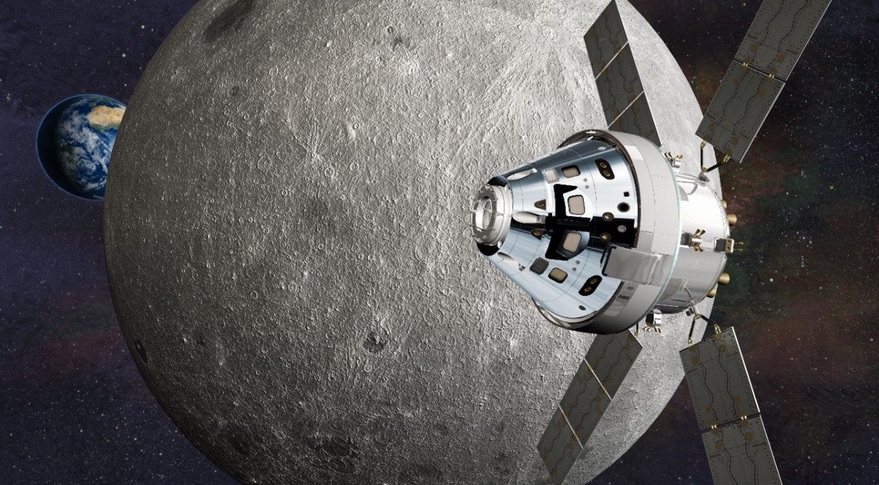
LOS ANGELES — NASA announced Sept. 23 it was awarding a contract to Lockheed Martin for long-term production of the Orion spacecraft, covering as many as 12 spacecraft that would meet NASA’s anticipated needs into the 2030s.
The Orion Production and Operations Contract includes an initial order of three Orion spacecraft, for missions Artemis 3, 4 and 5, for $2.7 billion. NASA plans to purchase three more Orion spacecraft, for Artemis 6, 7 and 8, in 2022 for $1.9 billion. Those spacecraft will be ordered under cost-plus contracts.
The contract includes the option for up to six additional Orion spacecraft ordered through September 2030. Those will be ordered under firm-fixed-price contracts, with the price set based on cost data from the previous six Orion spacecraft.
“This contract secures Orion production through the next decade, demonstrating NASA’s commitment to establishing a sustainable presence at the moon to bring back new knowledge and prepare for sending astronauts to Mars,” NASA Administrator Jim Bridenstine said in an agency statement about the contract.
“This contract clearly shows NASA’s commitment not only to Orion, but also to Artemis and its bold goal of sending humans to the moon in the next five years,” Rick Ambrose, executive vice president of Lockheed Martin Space, said in an accompanying statement by the company.
The cost savings envisioned by NASA and Lockheed will come in part from reusability. Some interior components, from electronics to seats, from the Orion flying the Artemis 2 mission will be used again on the Orion for Artemis 5. The Orion crew module from Artemis 3 will fly again on Artemis 6.
“We have learned a lot about how to design and manufacture a better Orion — such as designing for reusability, using augmented reality and additive manufacturing — and we’re applying this to this next series of vehicles,” Mike Hawes, the Orion program manager at Lockheed Martin, said in his company’s statement. “Driving down cost and manufacturing them more efficiently and faster will be key to making the Artemis program a success.”
Hawes, in an April interview, also said reusability would play a role in achieving a goal of reducing Orion production costs by 50% over the long term. At the time, the company had a slightly different schedule for reuse, anticipating reflying the Orion crew module from what is now called Artemis 4 on the Artemis 7 mission.
The new contract had been in the works for some time. Hawes said in April that the company was finalizing a proposal for that contract with that 50% cost reduction goal, although neither NASA nor Lockheed Martin said if this new contract will achieve that goal.
At a Sept. 18 hearing of the House Science Committee’s space subcommittee, Ken Bowersox, the acting associate administrator for human exploration and operations, said he expected the long-term Orion contract to be completed “fairly soon” and that the agency would transition from cost-plus to fixed-price awards. He also reiterated that, after the Artemis 3 mission in 2024, NASA planned one Orion launch a year, meaning that if all the options in the contract are exercised, it will cover NASA’s mission needs well beyond 2030.
NASA used the announcement to emphasize the role of the Johnson Space Center in Houston, which manages the Orion program, in the broader Artemis program. In August, NASA faced criticism from some members of the Texas congressional delegation for giving the Marshall Space Flight Center in Alabama management of the lunar lander program, even though the work will primarily be done by companies elsewhere.
NASA’s press release announcing the Orion contract took the unusual step of including comments from three members of Congress from Texas: Sens. Ted Cruz and John Cornyn and Rep. Brian Babin. All three publicly criticized NASA’s decision to give Marshall the lunar lander program, citing Johnson’s expertise in crewed spacecraft, and Babin dropped out of a scheduled appearance at the NASA announcement about the lunar lander program at Marshall.
“I am pleased that Administrator Bridenstine has heeded my calls and is taking significant steps to ensure that Johnson continues to grow with the exciting future of manned exploration that lies ahead,” Cruz said in the NASA statement, a comment he included in a release from his own office. “More needs to be done, and I look forward to production ramping up in the weeks and months to come and to more opportunities with NASA.”
But, as with the lunar lander program run by Marshall, much of the Orion work will be done at locations other than the Johnson Space Center. Lockheed’s announcement noted that assembly of the Artemis 2 Orion spacecraft was already “well underway” at the Kennedy Space Center in Florida.
https://spacenews.com/nasa-awards-long-term-orion-production-contract-to-lockheed-martin/
2019-09-24 04:30:03Z
52780391922140
Bagikan Berita Ini














0 Response to "NASA awards long-term Orion production contract to Lockheed Martin - SpaceNews"
Post a Comment